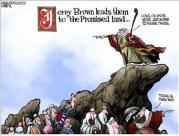There’s an off-year election today in the United States. There are no contests for the White House or Congress, but that doesn’t mean there aren’t any important choices being made.
I say that notwithstanding the fact that the big races between politicians at the state and local level aren’t expected to be close.
Governor Christie in New Jersey is poised for a landslide victory in his race for a second term. The only interesting aspect of this race is whether he will use his reelection as a springboard for a run at the White House in 2016. That my please you, depending on whether you focus on his rhetoric(here and here) or his record (here and here).
Bill de Blasio is going to be elected Mayor of New York City, replacing a politically correct Napoleonic busy-body (see here, here, here, here, andhere) with a hard-left statist.  I expect many productive people will be fleeing in the next few years. Given what will happen, I suspectDetroit-on-the-Hudson will be the future name of NYC.
I expect many productive people will be fleeing in the next few years. Given what will happen, I suspectDetroit-on-the-Hudson will be the future name of NYC.
Terry McAuliffe, a former Clinton fundraiser, will probably become Governor of Virginia. The GOP in the state has been dispirited and weak every since the corrupt Republican governor imposed a big tax hike, though the GOP candidate has a slight chance for an upset because of growing anti-Obamacare sentiment.
Recommended
The contest that should command our attention is Amendment 66 in Colorado, a ballot initiative that would eliminate the state’s 4.63 percent flat tax and replace it with a so-called progressive tax regime with rates of 5 percent and 5.9 percent.
Here’s how the Wall Street Journal describes the proposal.
Colorado has veered to the political left in recent years, and on November 5 it may take another leap toward California. The Democrats and unions who now run state government are promoting a ballot initiative that would raise taxes and unleash a brave new era of liberal governance. …a $950 million revenue increase for politicians in the first year alone.
The real problem is what happens once the flat tax is gutted and politicians can play divide and conquer with the tax code.
…the real prize is down the road. Once a graduated tax code is in place, unions and Democrats will try again and again to raise tax rates on “the rich.” This has happened everywhere Democrats have run the show in the last decade, from Maryland to Connecticut, New York, Oregon and California. Within a decade, the top tax rate will be closer to 8% or 9%. …that won’t make the state any more competitive in its interior U.S. neighborhood, where states like Kansas and Oklahoma are cutting tax rates. High-tax states created one net new job for every four in states without an income tax from 2002-2012, according to a study for the American Legislative Exchange Council.
So which side will win this vote?
 Though I realize that may be a foolish guess. After all, 54 percent of crazy Oregon voters approved a tax hike in 2010 and their southern neighbors in the suicidal state of California voted by a similar margin for a class-warfare tax hike in 2012.
Though I realize that may be a foolish guess. After all, 54 percent of crazy Oregon voters approved a tax hike in 2010 and their southern neighbors in the suicidal state of California voted by a similar margin for a class-warfare tax hike in 2012.
I’d feel a lot more confident, however, if we could replace Colorado’s voters with some sensible people from Switzerland. When faced with a class-warfare tax hike referendum in 2010, they voted against it by a very strong 58.5-41.5 margin.
And it was Swiss voters who overwhelmingly voted (84.7 percent) for the “debt brake” in 2001. And as I noted just yesterday, that de facto spending cap has been quite effective in controlling the burden of government spending.
Anyhow, if you know any Colorado voters, you may want to send them this video.
Regardless of how they vote, they should understand the potential consequences if Amendment 66 is approved.
P.S. Some Colorado voters just made a very sensible decision to defend the Second Amendment, but it’s unclear whether they have a similar attitude about economic liberty.


